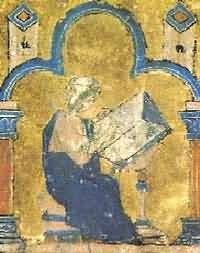 Archbishop of Tyre and historian, born probably in Palestine, of a European family which had emigrated thither, about 1127-30; died in 1190, the exact date being unknown. It is not known whether he was French or English. His studies, which were made “beyond the seas”, in Italy or France, seem to have been very comprehensive, for besides Greek and Latin he learned Arabic, which he knew sufficiently well to write a history of the Mussulmans according to Arabic manuscripts. He knew the Classic authors, and cites Virgil, Horace, Ovid, Livy, Cicero, etc. He was at Tyre in 1165 and had become a cleric; it was he who blessed (29 Aug., 1167) the marriage between Amaury, King of Jerusalem, and Maria Comnena, niece of the Emperor Manuel. He became Archdeacon of Tyre, fulfilled an important diplomatic mission to Manuel Comnenus (relating to the alliance between the Byzantine Empire and the Kingdom of Jerusalem against Egypt), and was tutor to Amaury’s son, the unfortunate Baldwin, who was stricken with leprosy. Baldwin IV, who became king in 1174, appointed William chancellor of the kingdom and then Archbishop of Tyre. Threatened by Saladin and rent by internal disorders, the very life of the kingdom was menaced and William was sent to Europe to arrange for a new crusade (1178); he assisted at the Council of the Lateran (1179), held by Alexander III returned by was of Constantinople, and landed in Palestine, 12 May, 1180. Becoming involved in the disturbances of the kingdom, he lost his post of chancellor (1183), and when the clergy of Jerusalem wanted to elected him patriarch the queen-mother, Maria Comnena, preferred Heraclius to him. The end of his life is obscure. He returned to the West to protest to the pope against the appointment of Heraclius and also to arrange a crusading movement. He assisted at the meeting of Gisors, in which the Kings of France and England, Philip Augustus and Henry II, took the cross (1188). According to a suspicious narrative in the chronicle of Ernoul he was poisoned at Rome by an emissary of Heraclius.
Archbishop of Tyre and historian, born probably in Palestine, of a European family which had emigrated thither, about 1127-30; died in 1190, the exact date being unknown. It is not known whether he was French or English. His studies, which were made “beyond the seas”, in Italy or France, seem to have been very comprehensive, for besides Greek and Latin he learned Arabic, which he knew sufficiently well to write a history of the Mussulmans according to Arabic manuscripts. He knew the Classic authors, and cites Virgil, Horace, Ovid, Livy, Cicero, etc. He was at Tyre in 1165 and had become a cleric; it was he who blessed (29 Aug., 1167) the marriage between Amaury, King of Jerusalem, and Maria Comnena, niece of the Emperor Manuel. He became Archdeacon of Tyre, fulfilled an important diplomatic mission to Manuel Comnenus (relating to the alliance between the Byzantine Empire and the Kingdom of Jerusalem against Egypt), and was tutor to Amaury’s son, the unfortunate Baldwin, who was stricken with leprosy. Baldwin IV, who became king in 1174, appointed William chancellor of the kingdom and then Archbishop of Tyre. Threatened by Saladin and rent by internal disorders, the very life of the kingdom was menaced and William was sent to Europe to arrange for a new crusade (1178); he assisted at the Council of the Lateran (1179), held by Alexander III returned by was of Constantinople, and landed in Palestine, 12 May, 1180. Becoming involved in the disturbances of the kingdom, he lost his post of chancellor (1183), and when the clergy of Jerusalem wanted to elected him patriarch the queen-mother, Maria Comnena, preferred Heraclius to him. The end of his life is obscure. He returned to the West to protest to the pope against the appointment of Heraclius and also to arrange a crusading movement. He assisted at the meeting of Gisors, in which the Kings of France and England, Philip Augustus and Henry II, took the cross (1188). According to a suspicious narrative in the chronicle of Ernoul he was poisoned at Rome by an emissary of Heraclius.
William composed an account of the Council of the Lateran of 1179 and “Gesta orientalium principum”, a history of the Orient from the time of Mahomet, fragments of which have been preserved in the “Historia orientalis” of Jacques de Vitry. But the chief work of his which has reached us is the “Historia rerum in partibus transmarinis gestarum”, or “Historia Hierosolymitana”, in twenty- three books. It is a general history of the Crusades and the Kingdom of Jerusalem down to 1184. The work was begun between 1169 and 1173, at the request of King Amaury. The first sixteen books (down to 1144) were composed with the assistance of pre-existing sources, Albert of Aix, Raimond d’Aguilen, Foucher of Chartres, etc. On the other hand books seventeen to twenty-three have the value of personal memoirs. As chancellor of the kingdom the author consulted documents of the first importance, and he himself took part in the events which he recounts. He is therefore a chief source for the history of the Kingdom of Jerusalem. His account is in general remarkable for its literary charm. Very intelligent and well informed, the author had very broad views; from his stay atConstantinople he acquired a certain admiration for the Byzantine Empire, and his temperate opinions of John and Manuel Comneus are in contrast with the tone of other European chronicles. The book of William of Tyre was continued by Ernoul and Bernard of Corbie down to 1231. Editions- “Historiens occidentaux des croissades”, I (Paris, 1844); P.L., CCI, 209-892.